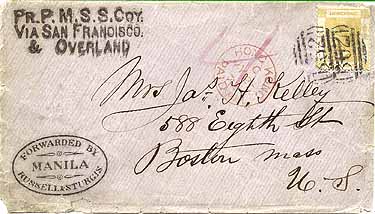| USE
OF HONG KONG STAMPS ON PHILIPPINE MAIL
The
Trans-Pacific steamer service between Hong Kong and San Francisco via Yokohama
was operated by the American owned Pacific Mail Steam Ship Company. It
commenced in 1867. The treaty between the United States and Great Britain,
effective July 1, 1868, established a special rate of 8 Hong Kong cents
per half ounce for mail from Hong Kong and Treaty Ports to anywhere in
the United States. With the completion of the Trans-Continental Railroad
in the United States in 1869, this became the standard route to send mail
between the Far East and all parts of USA. Other American and Canadian
companies also operated steamers on this route: the Occidental &C Oriental
Steam Ship Company from 1875; and the Canadian Pacific Steamship Company
between Hong Kong and Vancouver from 1887.

Figure
2: 1872 Manila to Boston cover carried on Trans-Pacific steamer Alaska.
Hong Kong adhesives pay treaty rate of 8 cents per halfpence. Russell &
Sturgis applied the handstamp "Pr.P.M.S.S.Coy..."
Mail
from Manila was sent to Hong Kong to catch the east-bound steamer, and
was franked with Hong Kong adhesives, to qualify for the special Treaty
rate. Such covers are stamped with Hong Kong and San Francisco circular
date-stamps inscribed PAID ALL, as in FIGURE 2. The rate increased to 12
cents per half ounce on April 1, 1877, and reverted to 8 cents per half
ounce on April 1, 1879.
The
Hong Kong B62 killer cancels the Hong Kong adhesives on every Philippine
cover, regardless of route.
The
circular date-stamp of Manila appears on just a few covers with Hong Kong
adhesives. They are dated between July 18, 1868 and December 9, 1868, and
they are all addressed to Britain. However, I know of other covers without
the circular date-stamp in the same date range also addressed to Britain.
I thus cannot make any definite conclusions as to why the cancellation
was applied to some letters but not others.
I know
of only two covers with Hong Kong adhesives, sent from towns other than
Manila. The first is an 1868 letter from a business firm in lloilo, and
has a cachet "STAMPED BY KER & CO MANILA", and a very weak strike of
the Manila cds. It is addressed to Edinburgh, Scotland. The second is a
letter datelined Vigan July 1, 1870 to Yokohama, which was franked with
14 cents Hong Kong adhesives. It has no Manila markings at all. In Hong
Kong, it was marked with a forwarding agent's cancel and a circular date-stamp.
"Singapore"
Adhesives
Singapore
used the adhesives of India, until the issuance of adhesives of Straits
Settlements in 1867. Consequently, any letter from Manila that first went
to Singapore, needed Indian adhesives up until 1867.
In
the Indian currency, I anna was divided into 12 pies. In the exchange rate
with British currency, 2 annas was equivalent to 3 pence.
The
earliest cover from Manila with Indian adhesives is addressed to Sydney,
New South Wales, and has a dateline of March 30, 1854. The latest known
covers are two 1867 letters to Switzerland each franked with 13 annas 4
pies. The later of these is dated June 17.
Straits
Settlements adhesives were issued on September 1, 1867. From this date,
any letters from the Philippines passing through Singapore were franked
with Straits Settlements stamps. I know of two Philippine letters sent
in 1867, bearing these adhesives with the crown overprint. Both are to
the same correspondent in Switzerland.
All
other Philippine letters with Straits adhesives were sent between 1872
and 1877. Most were addressed to European destinations, particularly France.
On the other hand, 1872 is the latest date we know for a letter with Hong
Kong adhesives to Europe. The explanation is that 1872 was the start of
the regular mail steamer service between Manila and Singapore.
Many
of the letters were carried from Singapore by French steam packets. The
major French port was Saigon, situated between Hong Kong and Singapore.
It was thus easier for Manila to predict the departure date of the French
steamer from Singapore than from Hong Kong. Furthermore, French steamers
landed at Marseilles, which was convenient for mail addressed to France,
while from late 1870, the P&0 steamers landed their mail at Brindisi
in Italy.
Acknowledgment
My
sincerely thanks to Dr. Geoffrey Lewis, a good friend of mine and a fellow
member of the Society of Postal Historians for sharing his research with
us. Dr Lewis has written the book "Postal History of the Spanish Philippines,
1565 - 1898" with co-author Don Peterson. The book is the first ever on
this subject. The emphasis is on routes and rates, so the book will be
a useful reference for any collector of maritime postal history of 19th
century Asia, Dr Lewis won the Grand Prix at the 1996 Taipei FIAP Exhibition
for his collection of Philippines Postal History.
The
book was published in December 2000, and the cost of US$95.00 includes
surface postage from USA. Further details at www. custom-made.com.au/book.htm
or from Dr Geoffrey Lewis, email glewis@custom-made,auoratP,O.Boxl96, Randwick
NSW 2031, Australia.
Reproduced
from The Hong Kong Philatelic Society, Journal No. 5, February 2001 publication,
with
permission of Dr. Lewis, who was also kind enough to provide us the colored
images.
|

